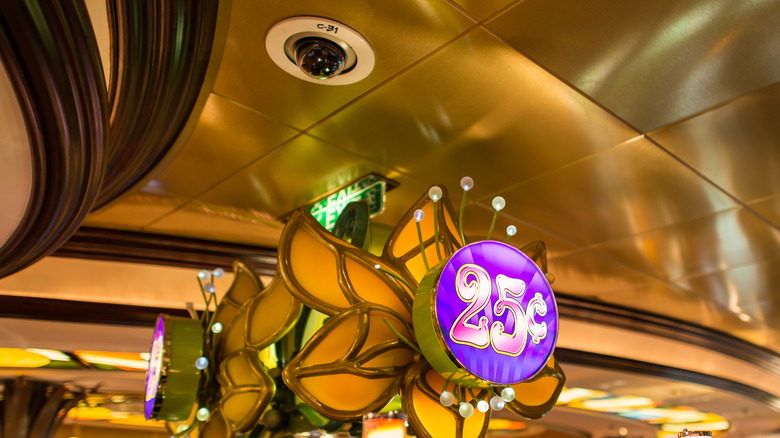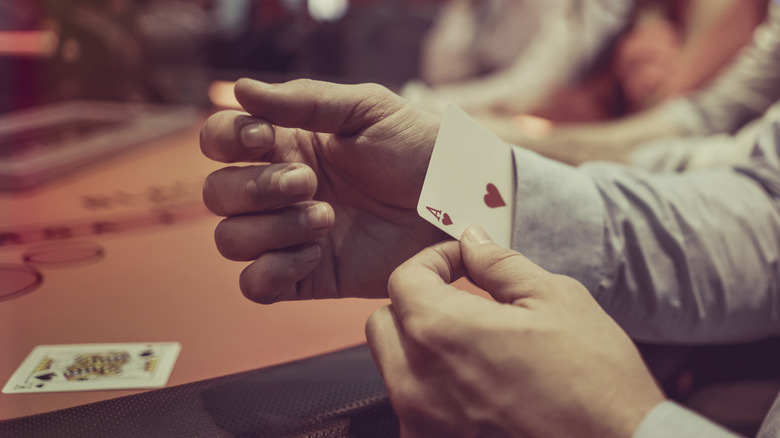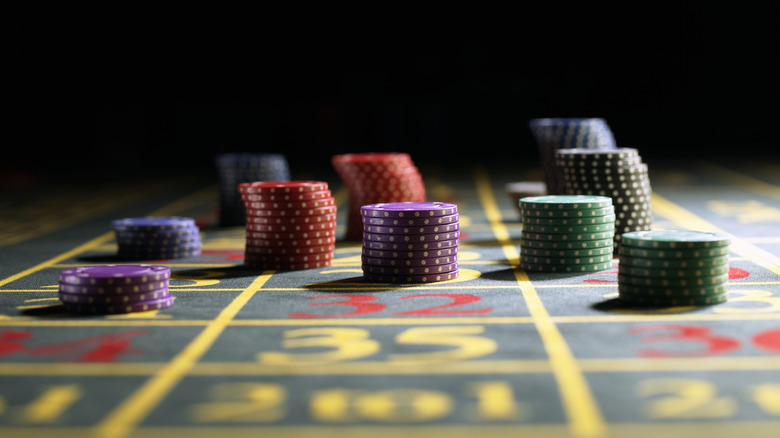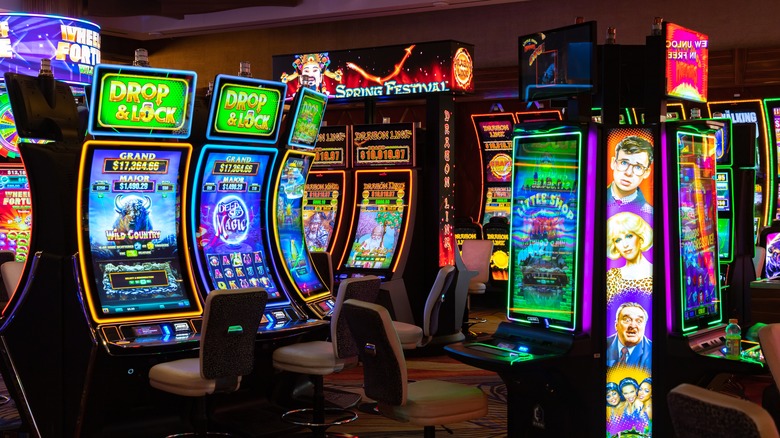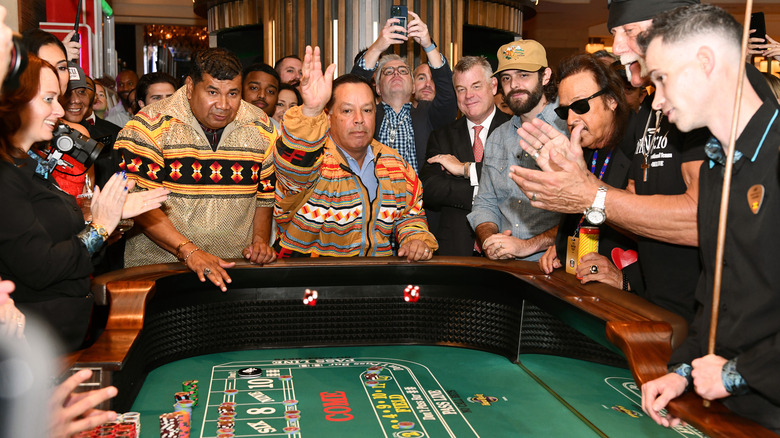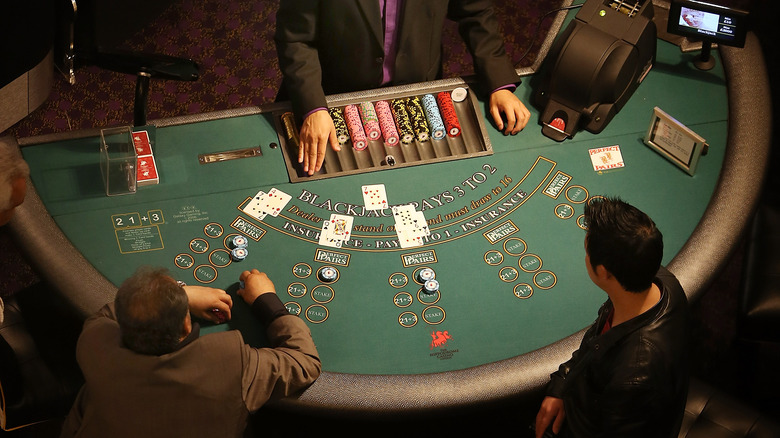12 Secrets Casinos Don't Want You To Know
Humans have been gambling for as long as we've had language to make wagers, and opposable thumbs to better toss down knucklebones. The modern concept of a casino, however, didn't emerge until the establishment of the Casino di Venezia in Venice, the first in the world. As the years went by, from Monaco's Monte Carlo to Vegas' Bellagio, game makers perfected their formula for strongarming Lady Luck out of the equation and relieving many a poor sap of their hard-earned dough. At a glance, it may seem like this was all a process of evolution; as if poker chips and green felt tables happened on accident through years of experimentation. That's not quite so.
In reality, casinos are masterpieces of psychological manipulation. Whether you're just stealing a look at their glitzy entrance signs, or taking an innocent stroll through the rows of slot machines, they're meddling with your brain chemistry. Not with mind control devices, mind, but with proven strategies that make you stay longer, spend more, and come back tomorrow to do it all again. Some of these strategies are among the 13 secrets casinos don't want you to know.
1. They keep you there for as long as possible
Casinos follow the same logic as malls: the longer you're on their premises, the more money you're likely to spend. And they do this in some surprisingly simple — yet effective — ways. They have very few windows so you lose your sense of natural time-telling via the sun. Clocks are next to non-existent; the hours will fly by if you can't check the time. Lit-up interiors look the same at 4 p.m. or 4 a.m., and the gaudy carpets and bright, flashing lights of slot machines trick your lizard brain into thinking it's stay-up time, not bedtime.
It doesn't end there. They'll never stop topping up your free alcoholic drinks (even on a cruise ship's casino) to break down your inhibitions and make you want to stick around. Should you decide to abandon their money-guzzling machines, you'll have to meander through a neverending maze of card game tables and bars. Locating a bathroom — which is never easy to find — forces you to pass more and more games in the hope you'll cave and blow through another dozen chips. And to keep your spirits high after frequent losses, slot machines play jolly sounds, background music is cozy, and croupiers treat you like you're Johnny Cash. From root to stem, a casino feels like a good place to be — even when it's objectively not.
2. They watch you at all times
Move over, Big Brother. Casinos make U.S. intelligence agencies look like a bunch of ninnies with the degree to which they surveil you. Most have thousands of cameras with a round-the-clock security team watching every card deal and tug on a slot machine lever. These systems are equipped with facial recognition technology and behavior algorithms that profile you in terms of the threat you pose to the casino's bottom line. Security teams run the whole outfit like a police force. Some venues have false mirrors that allow guards to watch you and secret doors that allow staff to quickly move through the area. Vegas in particular has become a proving ground for bleeding-edge surveillance tech that often makes its way into government buildings and airports.
Most of the surveillance, naturally, is designed to catch cheaters. Prolific casino fraudsters will wear disguises and use sleight of hand to mark cards or place false ones. Casinos have a long history of dealing with sophisticated, high-profile schemes conducted by breathtakingly talented con men who stole millions before being caught. The fictional ones from your favorite movie setting are based on reality. They may not take you into a backroom if they catch you and beat you bloody like they used to, but they will escort you off the premises and ban you forever. In the vast majority of cases, though, security is just there to tackle the occasional rowdy drunk.
3. They share info with competitors about cheaters
Let's suppose (purely as a thought exercise) that you get caught cheating; say you're exploiting a glitch in slot machines to win an illegal jackpot. The casino will throw you out (legal repercussions aside) and hit you with a lifetime ban. No big deal, you think, and head to the next casino down the road to do it again. Good luck with that. Casinos run an "intelligence network" amongst themselves to keep a database of known cheaters and their methods.
Think of it like the MGM Grand version of the No Fly List. Once you break the rules at one location, you're persona non grata in all the rest, and this information spreads quickly. The entire nation might be on high alert for a specific individual in as little as two weeks once the bulletin goes out. They help out their rivals' establishments, too; it's a bit of quid pro quo to keep future undesirables off their own turf. Plus, government agencies employ the casino's services to keep tabs on launderers and mob bosses. Anyone who thinks they're clever enough to pull off a series of "Ocean's Eleven"-esque heists on the Strip, think twice.
4. No one will talk sense into you
An honest business would step in and tell you to sleep on it before you bet away your daughter's dowry. Sadly, you won't find that sort of humanity in a casino. This is a place where employees regularly witness heartbreaking scenes, just a few of which are depicted on Reddit. Redditor u/airwalkerdnbmusic tells about a time when a man with an inoperable brain tumor was throwing away thousands of dollars on poker rather than spending his final months with family. A drunk foreign student came to croupier u/HelixxOver and proceeded to bet away all his student financial aid, then begged casino management in tears for the return of his money — which fell on deaf ears. In another situation, u/PiPbOyMBB was told by one visiting couple that they'd sold their appliances to keep gambling, reasoning that they got free food and drink from the casino and therefore didn't need a fridge and microwave.
Case in point, you could lose your GoFundMe campaign money to a game of Texas Hold 'Em and nary an employee would blink an eye. No one is ever going to slap sense into you; if you give them money, they will take it, end of story. People with a predilection for gambling addiction should exercise the utmost caution. Seek professional therapy immediately if you are unable to control your gambling.
5. Some croupiers might steal from you
Being a croupier is a tough job. Aside from the heartwrenching aforementioned tragedies that make up an average Tuesday, they only earn an average of $15,450 a year. About 75% of their salary is based on tips, so we highly recommend passing them a few dollars as you would when tipping your Uber driver or wait staff. The best way for them to get those tips is to gladhand, make pleasant small talk, and pray to the heavens that the person they're dealing in wins. Or, in the case of a croupier detailed in a report by the Daily Mail, they might sneak a few chips into their socks — just one story among many.
Granted, this is an exceedingly rare occurrence you'll probably never run into. Casinos go SEAL Team Six on kleptomaniac employees, both to keep your business and to prevent the occasional inside job. Croupiers are almost always honest chaps just doing their job like anyone else. That said, make sure to stay vigilant of your chips. Avoid getting so drunk that you can't care for your belongings. If you do suspect theft, report it to security. They'll crack down on instances of malfeasance faster than you can play a hand.
6. They can ban you if you win too much
Casinos are a bit like all-you-can-eat restaurants. If you eat (or rather, win) too much, they will ban you — even if you never broke the rules. These are, after all, private businesses that can permaban anyone without giving a reason. That's free-market capitalism, baby. People have long suspected — though there is no conclusive confirmation — that casinos kick their biggest winners out. Evidence is hearsay, but there are tons of anecdotes about high rollers being escorted out the door with their winnings, never to return.
Whether or not that's true, there are two situations where you'll most likely be banned for winning too much. One, if they catch you counting cards. This is a mathematical strategy for predicting the next card in a game of blackjack. In an interview with Best Life, Jesse Champagne, a professional poker player, explains, "The thing is that while card-counting isn't technically illegal, casinos aren't typically in the business of losing, and if you're caught, you will kindly be asked to leave."
Having a lucky streak can also get you in trouble, especially if it's all in one game. Casinos may suspect you're cheating, but even if they can't find evidence to back up that assumption, they have every right to cut you off. "Casinos aren't in the losing money business and will refuse your action if you consistently crush their games," says Champagne.
7. Chips make you spend more
Casino chips are the symbol of the gambling industry and a fascinating one at that. They're made bespoke for the casino that issues them and are devilishly difficult — not to mention prohibitively expensive — to counterfeit. The most obvious reason casinos use chips is for accounting purposes. The uniform shapes and colors make it dead simple to count them whether at a baccarat table or in a back room. But there's a psychological effect at play here, too. Using casino chips makes you spend money with greater abandon.
It's similar to how a credit card will cause you to spend more than if you had used cash. Cash is finite, and forces you to be conscious of how you spend — and thus you spend less. A credit card is just an object that offers no identifiable physical characteristic of the monetary value it represents — and thus you spend more. Chips achieve the same effect. Your brain interprets them as pieces of plastic for playing a game, not currency. You'd be more hesitant to go all in if you had a pile of dollars in front of you rather than chips.
8. They can track their chips
Aside from their difficult-to-counterfeit design, chips have some less visible secrets. Namely, an RFID tag embedded within that they can scan. It's for this reason the best type of wallet during your travels includes RFID blocking to protect your cards. This tech makes locating and scanning objects easy without batteries or wires. Casinos use it to control their inventory of chips. For the most part, RFID-enabled chips exist to leverage smart technology and improve your casino experience. Some casinos now let you do all cashing in or out from your phone. Your fancy smart chips interact with a smart table, which tracks them as you place bets and rake in your wins. It allows for a streamlined, cashless experience so you spend less time waiting at cages — and, obviously, more money.
For those thinking they're slick enough to steal chips that don't belong to them, be warned. These RFID chips make such a gambit nearly impossible. According to a story by Singularity Hub, a man robbed the Bellagio for $1.5 million worth of casino chips. However, all the casino had to do to thwart him was deactivate all the chips worth more than $100 in his pull, leaving him with, effectively, a pile of Monopoly money. We can only assume they would do the same if they caught you pilfering from nearby stacks of chips.
9. Randomness is always against you
"The house always wins," they say, and while that's true, it's not for the reason you think. Many assume casinos decide when you win. They believe that, from the tables to the machines, there's some "invisible hand" nudging cards and spinning wheels to ensure you never make too much. Most of all, folks often hold to the belief that slot machines are rigged against you. This simply isn't true. Legal casinos (the only ones you should ever go to) fall under an umbrella of strict regulations that would bury them in fines and bad press coverage if anyone caught them putting their thumb on the scale, as it were. In reality, casinos don't have any reason to try and cheat you. Math is on their side.
Slot machines aren't rigged because, thanks to random chance, the "house edge" ensures they win the vast, vast majority of the time. Randomness is always in their favor, period. Casinos would love for everyone to know that their slots aren't rigged, but what they don't want you to know is that randomness gives them the house edge mathematically. Many people hang onto this idea of rigged machines and go play table games thinking they're skilled enough to outwit a multi-billion dollar gaming industry. Don't be deceived; games of chance all pit the bettor against entropy itself.
10. Slots have some of the highest win rates
While randomness is not your friend, some games are more predictable than others and give you a statistically higher chance of winning. These are "high-RTP" games, or "return to player." RTP represents a percentage of return on your wager that you can expect to get from a particular game. So if a game's RTP is an average of 99%, that means you would get about $99 back on a $100 bet. RTP is never more than 100% since, as we've discussed, the house edge is in the casino's favor.
So if you're feeling lucky, prioritize high-RTP games over the rest. Slots usually pay out the highest RTP in the casino, further putting to bed this idea that they're rigged. As you do this, though, keep in mind that this high-RTP still works to the casino's advantage. Why? Because slots create a dopamine reward loop very similar to the one you experience when scrolling through social media for hours. You encounter a lot of little wins — that's the high RTP at play. Like social media, it keeps you there for a long, long time, albeit playing and spending rather than watching content.
11. Some table games also have good odds
It might seem, given this list, that skill is immaterial when it comes to casino games. Fortunately, there are some instances where your card-slinging know-how will net you a bigger pull. Some table games have higher win rates than their peers, statistically speaking. These include blackjack, baccarat, craps, and poker variations like video poker and Pai Gow poker. House edge in all these games never exceeds 3% (an RTP of 97-99%). Games like poker will test your skill to its limits, but simple games like blackjack only require basic knowledge to win. Then there are games like craps that only require you to throw dice.
Do keep in mind, however, that a lot more factors come into play here compared to a slot machine, and thus a lot of variables that could spoil your winning streak. Slot machines are so popular and addicting because you're just yanking on a lever all night — something a toddler could do while blindfolded — and you will win at least something. Even simple blackjack requires you to be alert and deliberate. If you're looking for the simplest, easiest, most painless casino experience, then it's probably not at the tables.
12. They use faster dealers at night
Nighttime is any casino's primetime, and one sneaky little trick they use is to put their fastest, most skilled dealers and croupiers on the front lines once the sun goes down. One casino employee confirms this in a Reddit post. The logic is simple: the faster they take in bets, the quicker they can close out the tables and the more money they can make.
You can test this yourself by playing a game in the afternoon and then doing the same later that evening. The game will go much, much faster, which is something you wouldn't notice unless you were paying attention. It plays into casinos' psychological manipulation of your perception of time; you'll lose track of how long you've been there if games fly by. This is bad news for your RTP, as you'll be restricted to a tighter time threshold to place bets, pressuring you when you might be tired and inebriated. Unless you're sober and good under pressure, playing table games at night may not be the best strategy.


